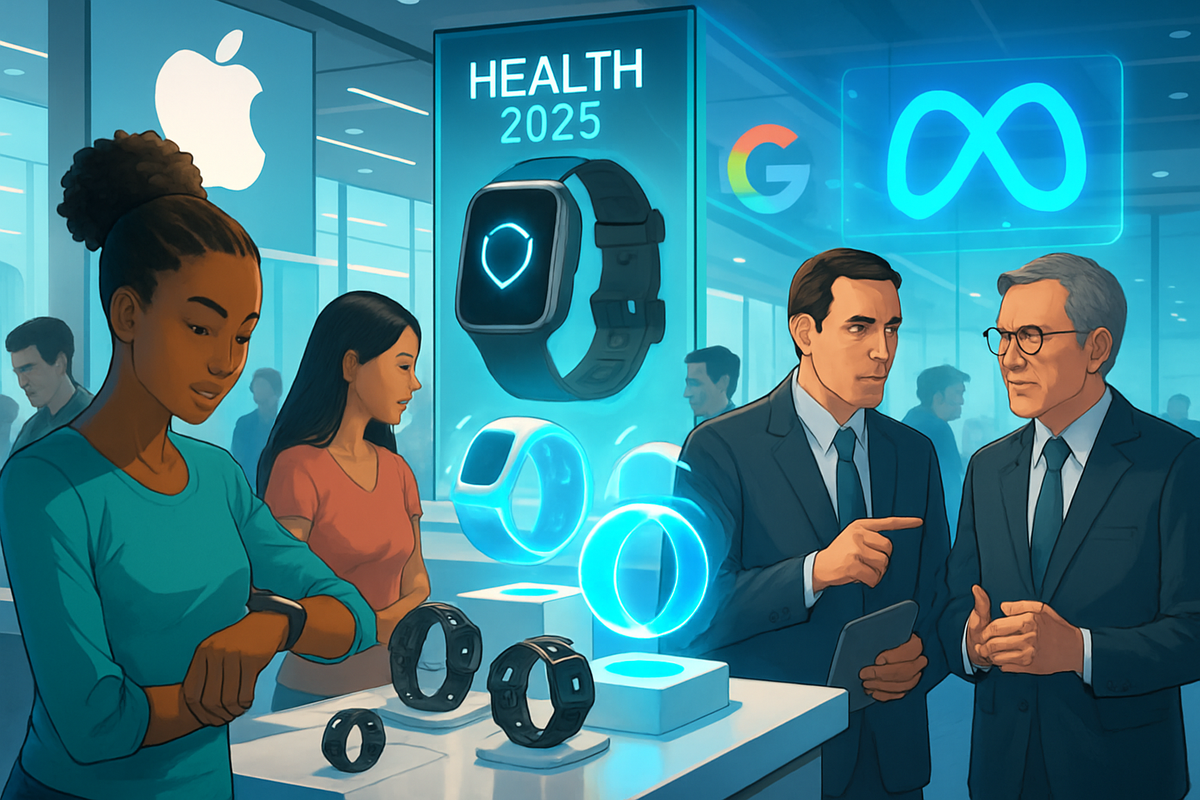The Battle for Your Wrist: How Smartwatch Giants, Tech Titans, and Policymakers are Shaping the Future of Wearable Health
As tech giants vie to own your health data, the stakes have never been higher. Discover how wearables transform from gadgets to wellness gatekeepers, challenging privacy and redefining the future of personal health monitoring.

Welcome to the Wrist Wars of 2025
Who owns your pulse? In 2025, the battle for your wrist is the defining story of consumer tech—where every step, heartbeat, and restless night is a data point in a high-stakes contest between Apple, Google, Meta, and a growing cast of policymakers. The promise: better health, longer lives, and the ultimate life hack. The risk: your most intimate data, up for grabs by corporations, insurers, and governments. Grab a (virtual) popcorn. This is not just about gadgets—it's about who gets to profit from your body’s story.
Smartwatches: From Novelty to Necessity
Let’s face it: the smartwatch is no longer just a fancy notification machine. In 2025, it’s your wellness sentinel, your sleep coach, your digital nurse. Apple’s Series 10, Google’s Pixel Watch 3, Samsung’s Galaxy Watch 7, and Garmin’s Venu 3 aren’t just competing for style points—they’re vying to become the de facto gatekeeper of your health data.
“Wearables are now the front line of proactive health—monitoring, nudging, and (sometimes) tattling on our bodies before we even know something’s wrong.”
- Apple Watch Series 10: Sleeker, smarter, and now with sleep apnea detection—if you’re in the right country.
- Google Pixel Watch 3: Fitbit smarts, two-day battery (finally!), and new safety features like pulse loss alerts.
- Samsung Galaxy Watch 7: Best-in-class sleep tracking and daily wellness scores. (Your dreams have never been so thoroughly analyzed.)
- Garmin Venu 3 & Forerunner 265: For the fitness-obsessed, these are data-rich powerhouses. GPS accuracy so sharp, it’ll make your old pedometer blush.
And if you’re a ring-wearer, Oura’s latest is basically a sleep lab on your finger. The wearable revolution, in short, is fully accessorized.
The Policy Push: When Government Gets a Fitness Tracker
Enter the policymakers. In a plot twist worthy of a Black Mirror episode, health agencies are now wearable evangelists. U.S. Health Secretary Robert F. Kennedy Jr. wants every American outfitted with a wearable by 2029—the cornerstone of his “Make America Healthy Again” campaign.
Meanwhile, the Trump Administration is rolling out a new initiative to let Americans share medical records with private tech platforms. The goal: turbocharge chronic disease management and empower patients with AI-powered health assistants. The controversy: privacy experts are sounding the alarm about who gets to see—and monetize—your most sensitive health data.
“If your watch can spot an irregular heartbeat, it can also reveal you were at the donut shop at 2 a.m. Who else should get that info—your doctor, your insurer, or your favorite targeted ad platform?”
It’s a policy wild west, and the sheriffs are still arguing over the rules.
The Data Gold Rush: Monetizing Your Health One Step at a Time
Let’s talk about the real prize: your health data. Wearables generate a firehose of information—heart rates, sleep cycles, blood oxygen, and now, even mood and stress. Who gets to profit?
- Tech Giants want to use your data to improve products, power AI health assistants, and (let’s be honest) sell you stuff.
- Insurers are eyeing wearables as a way to price risk and offer “incentives”—or penalties.
- Researchers see a gold mine for public health insights—if they can get access.
- You may get personalized health nudges, but you might also get more ads for running shoes than you ever wanted.
In the fine print, many wearables aren’t covered by HIPAA, the U.S. law protecting medical privacy. That means your step count could be fair game for marketers—or, in some dystopian future, even the government.
The Privacy Paradox: Who’s Watching the Watchers?
Sure, you want to know if your heart rate spikes. But do you want Big Tech, Big Insurance, or Big Brother to know, too? The privacy debate is no longer hypothetical. With new government initiatives pushing for more data sharing, and companies promising “personalized health,” the lines between helping and surveilling are blurring fast.
Digital privacy advocates warn: Once your health data leaves your wrist, you have little control over where it goes, how long it’s kept, or who else gets to see it. Data breaches, algorithmic bias, or just plain old-fashioned snooping—all are on the table.
“The next time you close your fitness rings, ask yourself: who else is celebrating with you?”
What Comes Next: The Future of Health on Your Wrist
The convergence of wearable tech, AI, and policy is just getting started. Meta is rumored to be launching a smartwatch focused on XR and metaverse integration, while Apple and Google are pushing further into AI-powered health coaching. Meanwhile, new regulations are being drawn—and challenged—on both sides of the Atlantic.
- Expect more features: Real-time glucose monitoring, mental health tracking, even early disease detection—your wrist will soon know more about you than your best friend.
- Expect more debates: Who owns the data? Who profits? Who protects you when something goes wrong?
- Expect more choices: Will you trade privacy for convenience? Will you demand more control? Or will you just want a watch that, you know, tells the time?
How to Stay Smart (and Sane) as a Wearable Health Consumer
- Read the fine print: Know what your device collects, and who it shares data with.
- Use privacy settings: Most devices let you limit sharing—if you dig deep enough.
- Stay informed: Policy is changing fast. Follow credible news (and subscribe to this blog for the latest insights!).
- Be an advocate: Ask companies and policymakers tough questions. Your body, your data, your rules.
Join the Conversation—Become a Funaix Insider!
Enjoyed this deep dive into the future of wearable health? Only subscribers can read and write comments on our blog—and subscribing is free (for now). Become a Funaix Insider today to unlock smart news, exclusive perks, and a front-row seat to the wrist wars of tomorrow. Your health data may be up for grabs, but your voice is yours—use it!
Final Thought
The future of health is personal, political, and deeply technological. The giants may be battling for your wrist, but the real power? It still lies in your hands. Or, you know, on your wrist. Stay curious, stay critical, and don’t forget to close those rings—just maybe with one eye on the privacy settings.




